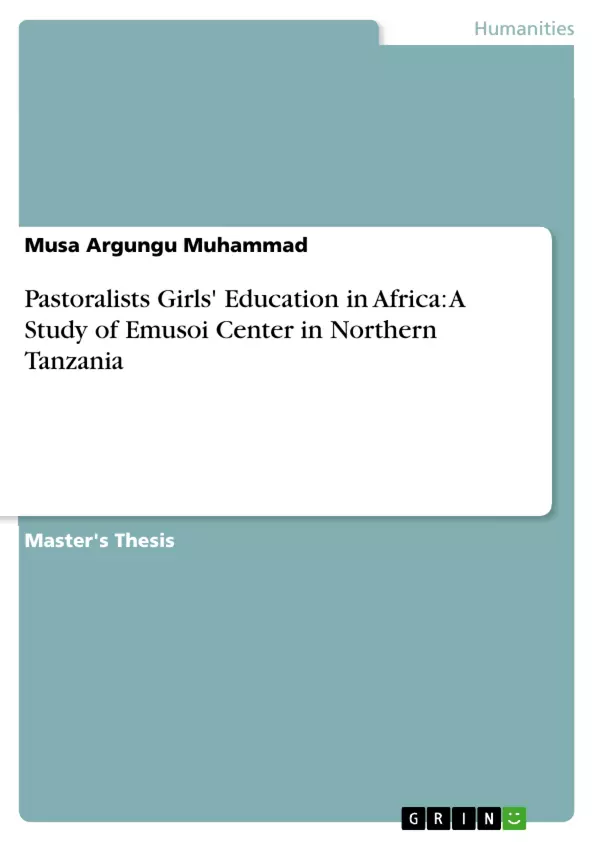This dissertation has found that providing services such as infrastructure and welfare services to groups of people who are on the move, has historically been very difficult. Providing services such as education, to a society which is either migratory or just beginning to stabilize, and does not value education, particularly for girls, is seemingly difficult. The Tanzanian Maasai people are the perfect example of such a society. Many problems adversely affect their girls’ enrolment, regular attendance and performance in school: lack of schools, the distance they must walk to go to school, a dangerous environment to walk through, fees, lack of food, poor standards of education in the schools, lack of classrooms, books, desks, teachers and learning supplies, also the transhumant nature of the society and the customs and culture of the community. All these factors are found to greatly affect both boys and girls, but have the greatest impact on girls.
However, the Emusoi Center has provided an approach for keeping these girls in school by involving pastoralist NGOs, churches, government leaders and members of parliament from the pastoralist area. Religious leaders identify possible students, government and Parliament Members use their power to ensure parents allow their girls to attend school, especially in instances where the girls are forced into marriage. The Center monitors the students’ progress at the end of every term and maintains a close contact with the schools in order to follow up the students’ progress. The Center also involves students who have finished their O-level studies as student’s mentor and as a role model to empower the new comers and those already enrolled. They accompany the new students to schools, hospital, and also help with administrative task such as accounting and secretarial work.
Inhaltsverzeichnis (Table of Contents)
- Introduction
- CHAPTER ONE
- CHAPTER TWO
- 2.0 Literature review and theoretical framework
- 2.1 Overview of girls' education
- 2.2 Pastoralist Girls' Education
- 2.3 Introduction
- 2.4 Concept and trends
- 2.5 Constraints
- 2.5.1 Policies
- 2.5.2 Poverty
- 2.5.3 Traditional practices and culture
- 2.5.4 Distance between the home and school
- 2.5.5 Dilapidated structures
- 2.6 Emusoi Center
- 2.8 Center capacity
- 2.9 Duplication
- 2.10 Approaches adopted by the center
- CHAPTER THREE
- 3.0 Methodology
- 3.1 Methodological approach
- 3.2 Expected approach to analysis
- 3.3 Limitation
- CHAPTER FOUR
- 4.1 Situational analysis of Maasai girls' education
- 4.2 Poverty
- 4.3 Distance to school and fear of wild animals
- 4.4 Culture
- CHAPTER FIVE
- 5.0 Conclusion
Zielsetzung und Themenschwerpunkte (Objectives and Key Themes)
This dissertation aims to investigate the challenges faced by pastoralist girls' education in Africa, specifically focusing on the Emusoi Center in Northern Tanzania. It explores the complex factors influencing girls' enrollment, attendance, and performance in school within a nomadic society, and examines the strategies implemented by the Emusoi Center to address these challenges.- Challenges to Pastoralist Girls' Education in Tanzania
- The Role of Culture and Traditional Practices
- The Impact of Poverty and Economic Factors
- The Emusoi Center's Approach to Supporting Pastoralist Girls' Education
- The Importance of Collaboration and Community Engagement
Zusammenfassung der Kapitel (Chapter Summaries)
The introductory chapter provides an overview of the dissertation, outlining its purpose, scope, and methodology. It establishes the context for the study by discussing the challenges of providing education to nomadic populations, particularly girls. The second chapter delves into the literature review and theoretical framework. It examines existing research on girls' education, specifically focusing on pastoralist communities in Africa. It explores the various factors that hinder girls' access to and participation in education, including cultural norms, poverty, and inadequate infrastructure. The third chapter describes the methodological approach employed in the dissertation, outlining the research methods, data collection techniques, and analytical framework. The fourth chapter presents a situational analysis of the challenges facing Maasai girls' education in Tanzania, highlighting the specific barriers to their schooling. It examines the impact of poverty, distance to school, fear of wild animals, and cultural norms on girls' educational opportunities.Schlüsselwörter (Keywords)
The dissertation focuses on the critical issues of pastoralist girls' education in Africa, emphasizing the role of the Emusoi Center in promoting girls' access to education. Key themes include cultural influences, poverty, distance to school, and the importance of community engagement in supporting educational initiatives. The research highlights the challenges of educating nomadic populations and the strategies employed by the Emusoi Center to overcome these obstacles.- Quote paper
- MSc. Musa Argungu Muhammad (Author), 2008, Pastoralists Girls' Education in Africa: A Study of Emusoi Center in Northern Tanzania, Munich, GRIN Verlag, https://www.grin.com/document/139803



